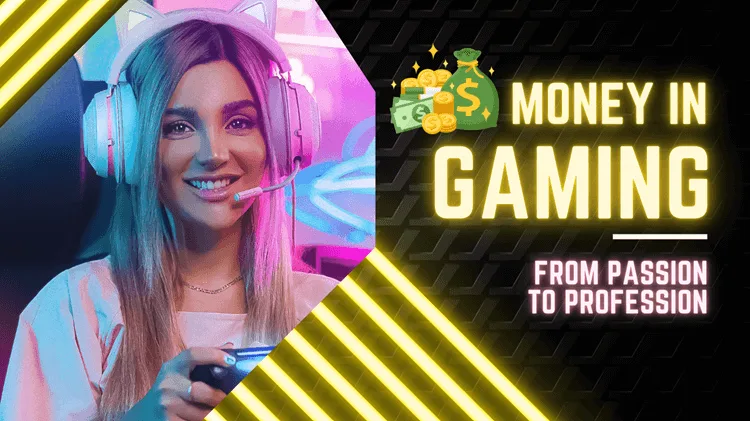Money in Gaming: From Passion to Profession
The digital revolution has transformed gaming from a simple hobby into a multi-billion dollar industry with diverse opportunities for income generation. As someone who's spent countless hours exploring virtual worlds and competitive scenes, I've witnessed firsthand how gaming has evolved into a legitimate career path for millions worldwide.
The Esports Gold Rush: Competing at the Highest Level
Professional gaming has exploded in recent years, creating a new breed of digital athletes who earn substantial incomes through their competitive skills. The rise of esports has been nothing short of phenomenal:
Tournament Prize Pools: The International Dota 2 championship made headlines in 2021 with its staggering $40 million prize pool, with winners taking home life-changing sums. Games like Fortnite, League of Legends, and Counter-Strike have similarly created millionaires through competitive play.
Team Salaries and Sponsorships: Beyond tournament winnings, professional players earn steady incomes through team contracts, often ranging from $3,000 to $15,000 monthly for established teams, with star players commanding even higher figures. Brand sponsorships add another significant revenue stream, with gaming peripherals, energy drinks, and tech companies all vying for player endorsements.
What fascinates me most about esports is how it mirrors traditional sports ecosystems while creating entirely new opportunities unique to digital competition. The accessibility—anyone with talent can potentially rise to the top regardless of physical attributes—makes it an exciting frontier for competitive individuals.
Content Creation: Building Your Gaming Brand
The democratization of content creation has revolutionized how gamers monetize their passion:
Streaming Success Stories: Platforms like Twitch and YouTube Gaming have created a new generation of gaming celebrities. Top streamers earn through:
- Subscriptions ($2.50-$3.50 per subscriber monthly)
- Donations (sometimes thousands in a single stream)
- Ad revenue
- Exclusive platform contracts (sometimes worth millions)
Diversified Content Channels: Beyond live streaming, content creators build income through:
- YouTube videos (tutorials, reviews, compilations)
- Social media presence
- Merchandise sales
- Sponsored content
The content creation path appeals to me particularly because it combines gaming skill with personality and entertainment value. It's not just about being the best player—it's about creating a connection with your audience through storytelling, humor, or educational content.
You may also like to read: Gaming Laptops: Ultimate Guide for Gamers in 2025
Industry Professionals: Careers Behind the Games
The industry itself offers numerous career paths beyond playing:
Game Development: From indie studios to AAA publishers, roles include:
- Game designers ($50,000-$100,000+ annually)
- Programmers ($70,000-$150,000+)
- Artists and animators ($45,000-$120,000+)
- Sound designers ($45,000-$110,000+)
Support Roles:
- Quality assurance testers ($30,000-$70,000)
- Community managers ($40,000-$90,000)
- Esports event organizers ($40,000-$100,000+)
- Gaming journalists and content editors ($35,000-$80,000+)
Having spoken with friends who transitioned from passionate players to industry professionals, I've learned that these roles offer stability that competitive play or content creation sometimes lack, while still allowing deep engagement with gaming.
Emerging Opportunities in the Digital Economy
The gaming landscape continues to evolve with new monetization methods appearing regularly:
Play-to-Earn Gaming: Blockchain-based games like Axie Infinity pioneered models where players earn cryptocurrency through gameplay. While volatile, this sector represents an interesting fusion of gaming and financial systems.
Virtual Item Trading: From CS
skins to rare MMO items, virtual goods trading has become a legitimate business for entrepreneurial gamers. Some rare items have sold for thousands or even tens of thousands of dollars.
Coaching and Skill Development: Elite players can earn $20-$100+ per hour teaching others, with specialized coaching platforms facilitating these connections.
Affiliate Marketing: Promoting gaming products, services, or other games through referral links generates passive income for many gaming content creators.
The intersection of gaming with other emerging technologies particularly excites me. Virtual reality, augmented reality, and artificial intelligence are creating entirely new gaming experiences—and with them, novel economic opportunities.
Challenges in the Gaming Economy
Despite the opportunities, challenges exist in turning gaming passion into sustainable income:
Market Saturation: With millions hoping to make it big in streaming or esports, standing out requires exceptional skill, personality, or innovative content.
Work-Life Balance: Professional gaming often demands 8-12 hour daily practice schedules, leading to potential burnout.
Regulatory Uncertainties: Real-money gaming faces varying regulations globally. In India, for example, the introduction of a 28% GST and new legal frameworks under the Bharatiya Nyaya Sanhita law created significant challenges for the money gaming industry in 2024.
Income Instability: Tournament winnings and content creation revenues can fluctuate dramatically, requiring financial planning and diversification.
Building Your Gaming Career: A Strategic Approach
From my experience and observations, successful gaming careers typically follow these principles:
- Specialize strategically: Focus on games or niches with sustainable audiences rather than just chasing trends.
- Diversify revenue streams: Don't rely solely on tournament winnings, streaming, or any single income source.
- Build transferable skills: Develop abilities in communication, project management, or technical areas that remain valuable even as games change.
- Network actively: Connections within the gaming community often lead to opportunities not publicly advertised.
- Invest in quality: Whether it's your gaming setup, content production equipment, or education, strategic investments yield better long-term results.
Conclusion: Gaming's Economic Future
The gaming industry continues to redefine how we think about entertainment, competition, and digital economies. What began as quarters in arcade machines has evolved into complex ecosystems where passion, skill, and creativity can translate into viable careers.
As someone deeply invested in gaming culture, I believe we're still in the early chapters of this economic transformation. The metaverse concept, increasing mainstream acceptance of gaming careers, and the blending of physical and digital experiences all point toward even greater opportunities in the future.
Whether you dream of esports glory, content creation success, or building tomorrow's gaming experiences, the pathways to earning through gaming have never been more diverse or accessible. The question isn't whether you can make money in gaming—it's which path aligns best with your unique talents and passions.
What gaming career path interests you most? Are you already monetizing your gaming skills, or just beginning to explore the possibilities? The conversation around money in gaming continues to evolve, and I'd love to hear your experiences and aspirations.






























